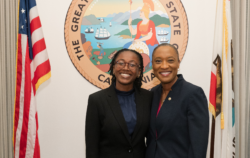
UW-Madison Scholar Turns TikTok Trend Into Research Opportunity
Gráinne McDonagh, a sophomore Posse Scholar at the University of Wisconsin-Madison, recently presented academic work at the Promoting Research in Social Media and Health Symposium (PRISM) at the University of California, San Francisco. Her topic: “Body Positivity Content on TikTok in Relation to the COVID-19 Pandemic.”
Gráinne, a biology and psychology major on the pre-med track, has long had her sights set on becoming a doctor, but says she became even more interested in mental health and well-being in her transition to college.
“You have to take advantage of every opportunity you get.”
With the pandemic lingering over the start of her UW-Madison experience, Gráinne found herself matching her academic curiosity with reflections on ways she saw people utilizing social media at home.
“There was so much pressure applied to everyone,” she says, recalling the socially-isolated context over the past two years. ”And on social media, you could see what other people were doing—even if only for the 15 seconds they were recording.”
Gráinne noticed that platforms like TikTok saw more people creating content about ways their bodies had changed during the pandemic, coining terms like “quarantine 15” or showing fitness transformations. She was motivated to channel her observations into academic work with the UW-Madison Social Media Adolescent Health Research Team (SMARHT), building a content analysis study of the top 50 TikToks using the hashtag “#bodypositivity.” Gráinne coded the videos for engagement, by user gender, and by mentions of subjects like fitness, eating disorders and Covid. At the time of her study, the “#bodypositivity” hashtag had been viewed by TikTok users more than 7.7 billion times.
Gráinne’s analysis showed her that, while few of those top 50 videos mentioned Covid, those that did had a significantly larger number of likes. “#Bodypositivity” videos then continued to increase by the billions as the pandemic persisted.
With her research study formalized, Gráinne sought opportunities to share it on public stages. At PRISM, she received positive feedback from attendees who have encouraged her to expand the project. She is now exploring ways to deepen her research with support from the SMARHT network.
“You have to take advantage of every opportunity you get,” Gráinne says of her academic focus, noting that the Posse community has been an important source of motivation and drive. “Without Posse, I might feel like an imposter—but with Posse, I feel so deserving.”

